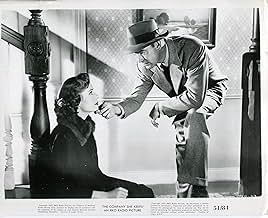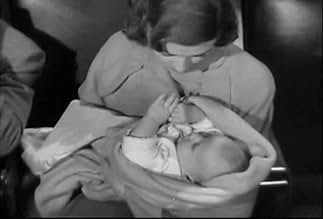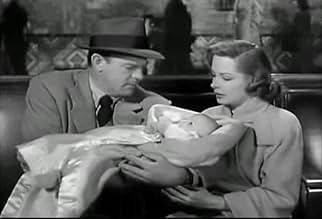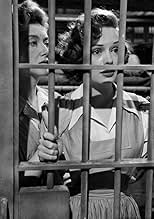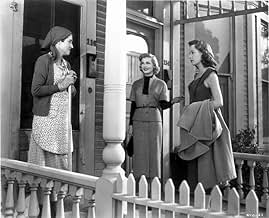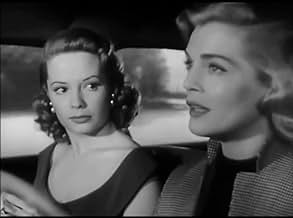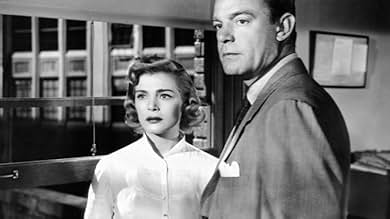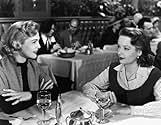IMDb RATING
6.3/10
673
YOUR RATING
A female ex-convict meets a handsome man and they start dating, but she jeopardizes their relationship by not telling him that she was in prison--and he doesn't reveal his involvement with h... Read allA female ex-convict meets a handsome man and they start dating, but she jeopardizes their relationship by not telling him that she was in prison--and he doesn't reveal his involvement with her parole officer.A female ex-convict meets a handsome man and they start dating, but she jeopardizes their relationship by not telling him that she was in prison--and he doesn't reveal his involvement with her parole officer.
Eric Alden
- Sergeant of Detectives
- (uncredited)
Parley Baer
- Steve
- (uncredited)
Larry Barton
- Store Detective
- (uncredited)
June Benbow
- Myrtle
- (uncredited)
Lela Bliss
- Window Shopper
- (uncredited)
Gail Bonney
- Nurse
- (uncredited)
- Director
- Writer
- All cast & crew
- Production, box office & more at IMDbPro
Featured reviews
This film does not fall short by any means. The Company She Keeps is a story of a young woman's plight named Diane Stuart (played by Jane Greer) that lands her behind bars on more than one occasion and when the opportunity for parole arises she has developed such a defeatist attitude that she feels she is fighting everyone in the (in)justice system. If Diane did not have bad luck she would have no luck at all. Once out of prison she visits with her parole officer Joan Willburn (played by Lizabeth Scott) and by accident or intention Diane finds the man of her dreams a newspaper columnist named Larry Collins (played by Dennis O'Keefe).
The three main characters in this film, Diane Stuart (ex-con), Joan Wilburn (parole officer), and Larry Collins (newspaper columnist) form the love triangle that has deception written all over this screen play. Lies, lies, lies, or is it just that each person is reluctant to hurt the others feelings?
As the film progresses we the audience realize that even female paroled prisoners are still considered ex-cons and their life is subjected to hell, especially in the year 1951 which is when this film was released. Truth be told, the rights and freedoms of ex- cons has not progressed much over the past 70 odd years.
Inevitably Diane finds herself in a police line-up once again for nothing at all and she realizes her life is crap and any chance of true love, life and freedom was nothing more than a pipe dream.
I won't spoil the film for anyone, but I will say that the director John Cromwell provided the audience with a surprise ending that should make most of his audience leaving the movie theater with a lot to talk about. The performances of Lizabeth Scott, Jane Greer, and Dennis O'Keefe were top notch. After close to 70 years since the films release I felt the film still contains a lot of human interest as it relates to crime and punishment.
I give the film 4**** of 5*****.
The three main characters in this film, Diane Stuart (ex-con), Joan Wilburn (parole officer), and Larry Collins (newspaper columnist) form the love triangle that has deception written all over this screen play. Lies, lies, lies, or is it just that each person is reluctant to hurt the others feelings?
As the film progresses we the audience realize that even female paroled prisoners are still considered ex-cons and their life is subjected to hell, especially in the year 1951 which is when this film was released. Truth be told, the rights and freedoms of ex- cons has not progressed much over the past 70 odd years.
Inevitably Diane finds herself in a police line-up once again for nothing at all and she realizes her life is crap and any chance of true love, life and freedom was nothing more than a pipe dream.
I won't spoil the film for anyone, but I will say that the director John Cromwell provided the audience with a surprise ending that should make most of his audience leaving the movie theater with a lot to talk about. The performances of Lizabeth Scott, Jane Greer, and Dennis O'Keefe were top notch. After close to 70 years since the films release I felt the film still contains a lot of human interest as it relates to crime and punishment.
I give the film 4**** of 5*****.
Scott and Greer are very good in this "woman gets out of prison" movie that could have been awful. Cromwell directs crisply and many shots are well lit and evocative. This may or may not be film-noir, depending on the viewer's perspective, but it holds up well. If you can find it on TV, it is well worth taping, since it is not easy to find on video.
The Company She Keeps might be viewed as John Cromwell's soft-hearted "sequel" to his great Caged of the same year (some of the same cast members reappear in small parts in both). Taking over the Eleanor Parker role -- the embittered parolee with a chip-on-the-shoulder attitude -- Jane Greer finally goes "freeside." Lizabeth Scott meets her at the train, not as a mentor into the world of vice but wasted as Greer's saintly parole officer. Greer makes it plain that she's none too happy with the constraints (a night-shift job, frumpy clothes, no drinking) imposed upon her, and promptly sets her hat for Scott's fiance Dennis O'Keefe, who tumbles right into it.
And this is where Ketti Frings' script loses whatever edge it had. The hard, manipulative Greer goes soft around the edges, conflicted and vacillating. Scott, meanwhile, magnanimously cedes O'Keefe to her rival and continues to advocate on her behalf with redoubled passion (an opposite change of heart would have furnished welcome friction).
Luckily, a few goblins still hover in the shadows, and, in a brief scene set in Los Angeles' municipal lockup, Cromwell manages to reprise some of the black magic of Caged. But the syrupy social messages and Frings' earnest kind-heartedness almost sink the movie, which nonetheless preserves one of Greer's rare appearances in the noir cycle, particularly savory at the movie's start and near its end. Just don't expect another Kathie Moffat from Out of the Past.
And this is where Ketti Frings' script loses whatever edge it had. The hard, manipulative Greer goes soft around the edges, conflicted and vacillating. Scott, meanwhile, magnanimously cedes O'Keefe to her rival and continues to advocate on her behalf with redoubled passion (an opposite change of heart would have furnished welcome friction).
Luckily, a few goblins still hover in the shadows, and, in a brief scene set in Los Angeles' municipal lockup, Cromwell manages to reprise some of the black magic of Caged. But the syrupy social messages and Frings' earnest kind-heartedness almost sink the movie, which nonetheless preserves one of Greer's rare appearances in the noir cycle, particularly savory at the movie's start and near its end. Just don't expect another Kathie Moffat from Out of the Past.
Jane Greer and Lizabeth Scott star in 1951's "The Company She Keeps," directed by John Cromwell and also starring Dennis O'Keefe. O'Keefe is columnist Larry Collins involved with parole officer Joan Wilburn (Scott), who has Diane Stuart (Greer) as a client. Stuart makes a play for Collins and gets him. The two fall in love, and Joan finds out about it, making her position rather difficult.
This isn't a big movie and provides a different sort of role for Scott. Here she's a good girl with shorter hair, and she almost reminds one of June Allyson. She's quite beautiful and does a good job, though I prefer her as a '40s bad girl. O'Keefe is a serviceable leading man.
The film belongs to the fabulous Greer. In the beginning, at her parole hearing, she's shy, soft and sweet. Once she's out - whoa! The angry, bitter tough gal comes through, only showing her vulnerable side once she falls for Larry.
Worth seeing for Greer.
This isn't a big movie and provides a different sort of role for Scott. Here she's a good girl with shorter hair, and she almost reminds one of June Allyson. She's quite beautiful and does a good job, though I prefer her as a '40s bad girl. O'Keefe is a serviceable leading man.
The film belongs to the fabulous Greer. In the beginning, at her parole hearing, she's shy, soft and sweet. Once she's out - whoa! The angry, bitter tough gal comes through, only showing her vulnerable side once she falls for Larry.
Worth seeing for Greer.
Parole officer (Scott) and parolee Diane (Greer) compete for the same man (O'Keefe), creating conflict on several levels. At best, the movie's about the difficulties of being on parole.
Oddball little programmer. Scott gets top billing, but as others point out, it's Greer who gets the screen time. And far from her usual slinky seductive role, she's not only de-glamorized, but also suitably dour-faced (just count her smiles; I stopped after one). All in all, it's a rather grim screenplay, drably photographed, and I can't believe the studio expected the final product to make money.
Despite the romantic triangle that strains believability, there are several striking scenes. Catch the iconic 40's diner where Diane gets her bottom-of-the-barrel meals. The sweat and steam just about drip off the wall. And that police line-up-- a graphic cross-section of the city's tough cookies, down-and-out'ers, and hopelessly pathetic (& one of the few barfing scenes from that era)-- are all herded along by a bullying cop (Freed). It's one of the more unvarnished glimpses of urban flotsam and jetsam from the period. Then there's the crowded jail cell where the camera abandons Diane (& us) to a nightmare of entrapment. It's an unnerving moment, very well done.
I would've liked the movie better had they made the triangle more credible, plus Scott's sacrificial character seems too good to be true. I expect the latter was RKO's effort at compensating for the harshness of the parole system as portrayed. Likely too, prestige producer John Houseman had something to do with the social realism phase, including the poignant overcoat episode. Anyway, reviewer bmacy's remarks on the influence of the previous year's Caged (1950) are on target. And, had this film carried through more with its realistic dimension, it might not be as obscure as it is.
Oddball little programmer. Scott gets top billing, but as others point out, it's Greer who gets the screen time. And far from her usual slinky seductive role, she's not only de-glamorized, but also suitably dour-faced (just count her smiles; I stopped after one). All in all, it's a rather grim screenplay, drably photographed, and I can't believe the studio expected the final product to make money.
Despite the romantic triangle that strains believability, there are several striking scenes. Catch the iconic 40's diner where Diane gets her bottom-of-the-barrel meals. The sweat and steam just about drip off the wall. And that police line-up-- a graphic cross-section of the city's tough cookies, down-and-out'ers, and hopelessly pathetic (& one of the few barfing scenes from that era)-- are all herded along by a bullying cop (Freed). It's one of the more unvarnished glimpses of urban flotsam and jetsam from the period. Then there's the crowded jail cell where the camera abandons Diane (& us) to a nightmare of entrapment. It's an unnerving moment, very well done.
I would've liked the movie better had they made the triangle more credible, plus Scott's sacrificial character seems too good to be true. I expect the latter was RKO's effort at compensating for the harshness of the parole system as portrayed. Likely too, prestige producer John Houseman had something to do with the social realism phase, including the poignant overcoat episode. Anyway, reviewer bmacy's remarks on the influence of the previous year's Caged (1950) are on target. And, had this film carried through more with its realistic dimension, it might not be as obscure as it is.
Did you know
- TriviaAt one point, four month-old Jeff Bridges, playing the baby Jane Greer is holding in the train station, was supposed to cry. To get him to cry, Jeff's mother, Dorothy Dean Bridges, suggested they pinch him.
- ConnectionsFeatured in 2019 Golden Globe Awards (2019)
- How long is The Company She Keeps?Powered by Alexa
Details
- Release date
- Country of origin
- Language
- Also known as
- The Company She Keeps
- Filming locations
- 114-116 North Hope Street, Los Angeles, California, USA(Diane Stuart's apartment building)
- Production company
- See more company credits at IMDbPro
- Runtime1 hour 22 minutes
- Color
- Aspect ratio
- 1.37 : 1
Contribute to this page
Suggest an edit or add missing content


